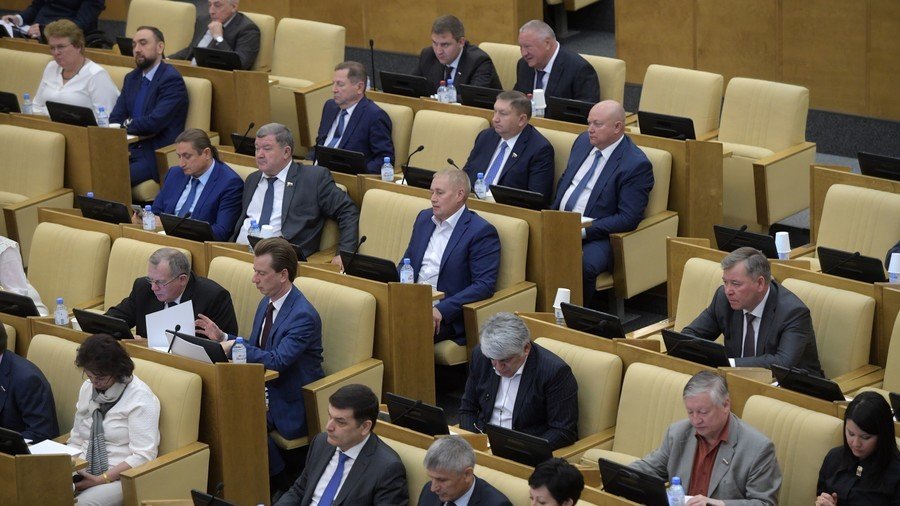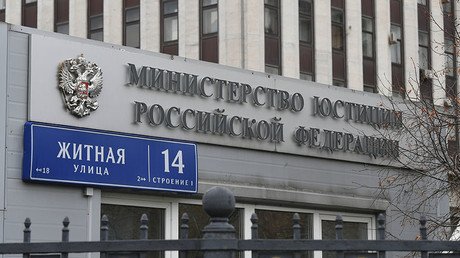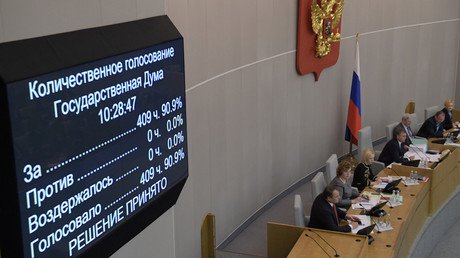New amendments order reporters working for 'foreign agent' companies to get same status

Russian MPs have prepared new amendments ordering reporters who receive money from foreign sources and promote the agenda of media outlets registered as ‘foreign agents’ to receive this status as private persons.
The motion has been prepared by lawmakers from the majority party United Russia and leftist parliamentary opposition party Fair Russia and was presented to the Lower House Committee for Information Policy on Tuesday, popular business-oriented daily Vedomosti reports.
If the bill is passed into law the status of ‘foreign agent’ would be attached to any organization, group or person who helps to promote the materials of foreign agent mass media outlets and help create content for them in exchange for payments. Such "secondary" foreign agents would have to follow rules similar to those introduced for the ‘foreign agent’ mass media: mark their materials as ones produced by an agent of a foreign state, undertake an annual obligatory audit and present reports about their work to the authorities once every six months.
The head of the State Duma Committee for Information Policy, MP Leonid Levin (Fair Russia), told TASS that both conditions mentioned in the bill should be met simultaneously.
"As for the fears that any blogger or internet user who reposts information from a foreign agent mass media outlet could be fined, we included a special explanation that a private person must do more than just repost some report to be labeled as a foreign agent. It is necessary that this person receives money from abroad and helps spreading the information originating from foreign agent mass media.
“The payment must be transferred from foreign companies whose activities include interaction with state agencies or with foreign agent mass media,” Levin said. Another of the bill's sponsors, deputy Duma speaker Pyotr Tolstoy (United Russia) emphasized that the motion was a forced measure.
“This is not our wish or our initiative; it would be really nice if we did not have to develop such bills. This is a reciprocal measure. This is a direct action bill that gives the executive power some ability to react to the infringement of our colleagues' rights in other countries," Tolstoy told TASS on Tuesday.
The deputy speaker also noted that the new bill will offer ordinary citizens some protection from unfair treatment. "As for the legal protection of ordinary citizens from some accidental decisions, we have taken the powers [to attach the status of foreign agent to individual journalists] from the Justice Ministry and passed them to the Prosecutor General's Office that would make decisions together with the Foreign Ministry," Tolstoy said.
In addition, the lawmakers excluded from the bill the demand to mention the foreign agent status of the mass media outlet in every repost of their content and the demand of automatic out-of-court blocking of web resources that publish such materials.
The Russian Law on Foreign Agents in Mass Media was signed into law in November 2017. The law applies to any foreign organizations that operate with or without registering as a company if they are engaged in putting out printed, audio, audio-visual, or any other content prepared for an unlimited group of people.
The bill was prepared and drafted as a reply to a US Department of Justice order to RT America to register as a foreign agent. US authorities threatened to freeze RT America's assets and arrest its chief if it did not comply. On November 10, RT America (officially registered as T & R Productions LLC) filed as a foreign agent with the department of justice.
By December 2017 the Justice Ministry put nine media companies on its list of foreign agents. These include Voice of America, Radio Free Europe / Radio Liberty, the Nastoyashee Vremya (Present Time) television, Azatliq Radiosi (the Tatar language branch of Radio Liberty) and several affiliated web-sites.
The original Russian Foreign Agents Law, introduced in late 2012, obliges all NGOs that receive funding from abroad and are engaged in political activities to register as foreign agents or risk substantial fines. In November 2014, the law was expanded by a bill making it illegal for Russian political parties to receive sponsorship from, or enter into any business deals with, NGOs that have ‘foreign agent’ status.
If you like this story, share it with a friend!

















